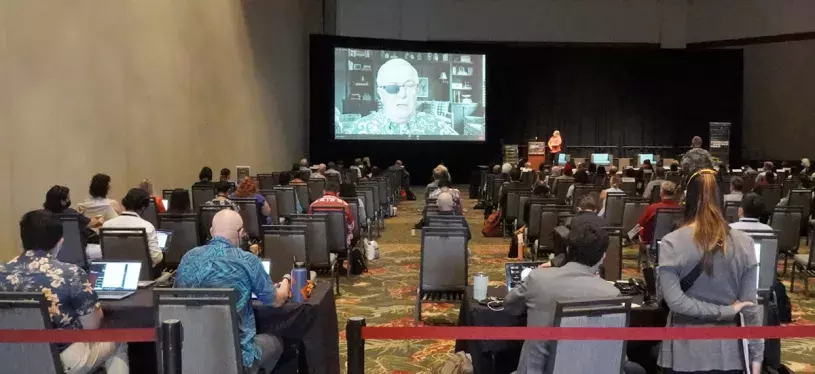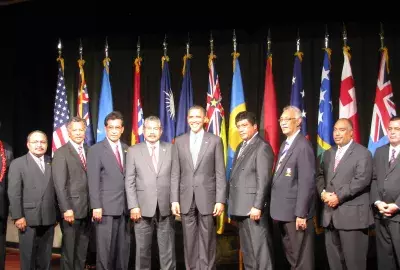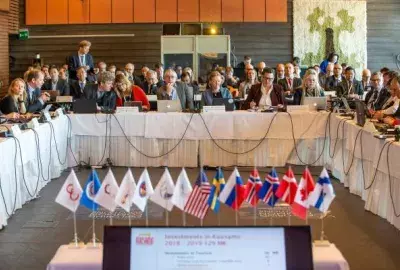
HONOLULU (June 30, 2022) - In a keynote address yesterday at the East-West Center International Media Conference, epidemiologist and EWC Senior Fellow Tim Brown criticized the West’s delayed reaction to the COVID-19 outbreak compared with Asia’s response. “The sense of urgency and concern in China and much of Asia was lacking in the West,” he said. In his video presentation titled “Close Encounters in an Uncertain Time: the Science-Public Health-Media Nexus in the COVID Era,” Brown also said that missteps along the way led to public mistrust and confusion.
Asia’s quick response, which included daily press briefings and increased border controls, came from the region’s earlier experience with the SARS and MERS coronavirus outbreaks. The West’s practice of reactive thinking, paired with the absence of central information centers, sparked confusion and misinformation, Brown said.
‘Infodemic’ deluge
“The main problem was it was such an absolute deluge of information that it made the concept of drinking from a firehose pale in comparison,” said Brown about the 24/7 pandemic coverage that has been dubbed the “infodemic,” a term coined by political scientist and journalist David Rothkopf.
To have effective public health communication, there must be a trusted messenger who is familiar with the pandemic and can speak to the public comfortably, Brown said. Decisions that were political rather than purely about public health left people turning to unreliable sources.
What have we learned?
Brown said that moving forward, “we need to build our synthesis capacity — the ability to quickly put together diverse sources of information to get a clearer picture of what they mean for policies. Advisory committees that are public health agencies must make their decisions and base their advice on up-to-date syntheses — acknowledging any gaps and limitations in the data that still exist.”
Information should be put out quickly and accurately for the public to make their own personal health decisions, he said, and it is essential that the messages sent out are concise and use terminology that the general public can understand. Being upfront and transparent with documentation will help with credibility.
Brown’s concluding message was stark: the pandemic is still with us and the virus that causes COVID continues to evolve rapidly, making the most current and accurate information even more important in order for people to grasp the bigger picture and plan their next steps. “You must not be falsely led to believe that the pandemic is over,” he said.
—By Sarah Tomita, University of Hawai‘i
HONOLULU (June 30, 2022) - In a keynote address yesterday at the East-West Center International Media Conference, epidemiologist and EWC Senior Fellow Tim Brown criticized the West’s delayed reaction to the COVID-19 outbreak compared with Asia’s response. “The sense of urgency and concern in China and much of Asia was lacking in the West,” he said. In his video presentation titled “Close Encounters in an Uncertain Time: the Science-Public Health-Media Nexus in the COVID Era,” Brown also said that missteps along the way led to public mistrust and confusion.
Asia’s quick response, which included daily press briefings and increased border controls, came from the region’s earlier experience with the SARS and MERS coronavirus outbreaks. The West’s practice of reactive thinking, paired with the absence of central information centers, sparked confusion and misinformation, Brown said.
‘Infodemic’ deluge
“The main problem was it was such an absolute deluge of information that it made the concept of drinking from a firehose pale in comparison,” said Brown about the 24/7 pandemic coverage that has been dubbed the “infodemic,” a term coined by political scientist and journalist David Rothkopf.
To have effective public health communication, there must be a trusted messenger who is familiar with the pandemic and can speak to the public comfortably, Brown said. Decisions that were political rather than purely about public health left people turning to unreliable sources.
What have we learned?
Brown said that moving forward, “we need to build our synthesis capacity — the ability to quickly put together diverse sources of information to get a clearer picture of what they mean for policies. Advisory committees that are public health agencies must make their decisions and base their advice on up-to-date syntheses — acknowledging any gaps and limitations in the data that still exist.”
Information should be put out quickly and accurately for the public to make their own personal health decisions, he said, and it is essential that the messages sent out are concise and use terminology that the general public can understand. Being upfront and transparent with documentation will help with credibility.
Brown’s concluding message was stark: the pandemic is still with us and the virus that causes COVID continues to evolve rapidly, making the most current and accurate information even more important in order for people to grasp the bigger picture and plan their next steps. “You must not be falsely led to believe that the pandemic is over,” he said.
—By Sarah Tomita, University of Hawai‘i
Web Article
Recent online articles and analysis that have been published on the East-West Center website.







